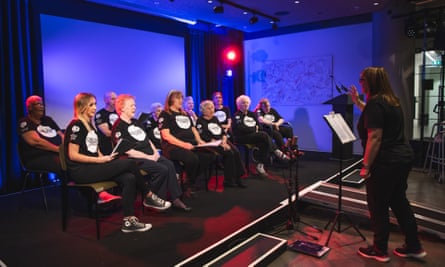Catherine has lived with dementia for five years. She can no longer find the words to talk to her children, but when she sings with her dementia choir she remembers the lyrics to songs from her childhood and joins in with word-perfect gusto.
Mark, diagnosed with dementia last year, was becoming isolated and depressed. Until, that is, his care home started a choir. Gradually enticed in by the music therapist, his mental health has transformed: now sociable and enthusiastic, Mark often encourages residents to have singalongs before bedtime.
Catherine and Mark are not alone in benefiting from the power of music. Research published in the Lancet has revealed music’s incredible power to improve the lives of the 994,000 people living with dementia across the UK: music therapy reduces agitation and the need for medication in 67% of people with dementia.
Music therapy has been found to ameliorate symptoms of dementia, such as anxiety, apathy, depression and agitation. Its impact is similar to exercise in releasing endorphins, with recreational group singing in particular leading to clinically important improvements in depression, as well as neuropsychiatric symptoms and generic quality of life.
Now, thanks to two groundbreaking initiatives, everyone with dementia has the chance to benefit from music’s power. The first, the Music Can digital platform launched this week and spearheaded by Universal Music UK, provides a free, dynamic, one-stop resource to help everyone use music in dementia care for themselves and others.

The platform includes a directory of support, playlists, music activities and advice and is a joint endeavour by the music industry, technology providers and cross-sector groups including the second initiative, the Power of Music Fund.
Sarah Metcalfe, from the Utley Foundation which is funding a grant, said: “Both these initiatives are gamechangers. They are potentially revolutionary. There are so many touching stories about the power of music that this platform can help replicate in other families.
“The man who was able to talk about his dementia diagnosis with his wife for the first time after he made a playlist of his musical memories that helped him reflect on this life. The woman who won’t get in the shower until her carer sings Fly Me to the Moon. A GP who prescribed a playlist to a dementia sufferer and, as a direct result, was able to reduce her sedatives by 65%.
“But these projects require grassroots organisations to be funded so people have that knowledge and information. Then evidence needs to be gathered, so that the NHS knows where to put money and where to invest.”
The Power of Music Fund will distribute a range of grants for dementia projects. It is hoped the pot, kickstarted by a £1m contribution from the Utley Foundation, will grow to £5m.
A grant of £500,000, established by the National Academy for Social Prescribing, will be given to the development of a centre of excellence – a partnership between healthcare providers, voluntary organisations, music providers and dementia support organisations.
The centre will test new approaches to integrating music as part of dementia care and design models of care which could be spread across England.
The fund, which opens for applications on 22 November, will also give smaller grants to grassroots dementia choirs and music groups to cover basic costs, such as room hire, travel and refreshments.
Nicole Meissner, a partner at BCG, the consulting group that helped develop Music Can, said: “These projects are vital not only to reach the people out there struggling with dementia who are not digitally savvy but also those communities where they are very well accepted or understood. It also means that dementia sufferers can have properly personalised care in a space that is still not very personalised.”
The initial focus for the Music Can platform will be on dementia but the goal is to adapt and develop the content for adults with severe learning difficulties, those with a range of different mental health conditions, vulnerable children and those who are isolated.
In its Power of Music report, the Utley Foundation and other groups called for music to be put at the heart of social prescribing, with the appointment of a Power of Music commissioner, who would spearhead a taskforce to integrate music into health, social care and wellbeing at governmental level.
